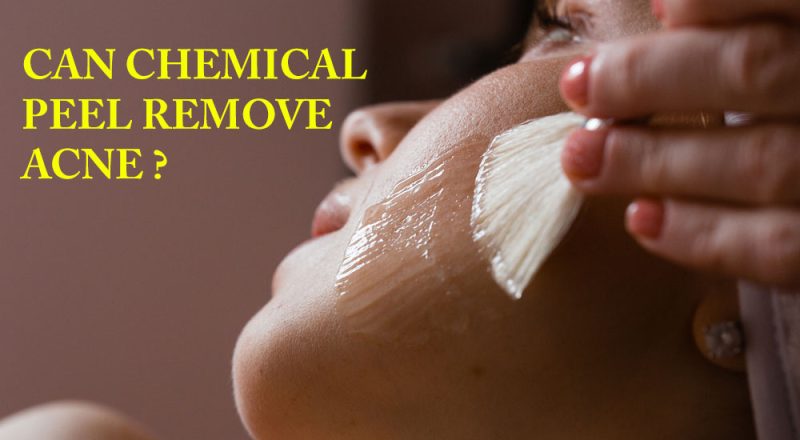A chemical peel is a cosmetic treatment that uses a solution to remove the top layer of dead skin cells from the face. This can improve the appearance of fine lines, wrinkles, uneven skin tone, and other skin imperfections. A chemical peel can also stimulate the production of collagen, which can help to improve the elasticity and firmness of the skin.
Some of the specific things that a chemical peel can do include:
- Exfoliate the skin to remove dead skin cells and improve the texture of the skin
- Reduce the appearance of fine lines and wrinkles
- Improve the tone and texture of the skin
- Reduce the appearance of acne scars
- Lighten hyperpigmentation, such as age spots and freckles
- Improve the appearance of sun-damaged skin
- Reduce the appearance of large pores
- Improve the overall appearance of the skin, making it look smoother, brighter, and more radiant
The effects of a chemical peel can vary depending on the specific type of peel used, the strength of the solution, and the individual’s skin type and condition. It is important to consult with a qualified healthcare provider before undergoing a chemical peel to determine the best treatment plan for your specific needs and goals.
Can Chemical Peel Remove Scars ?
A chemical peel can sometimes help to improve the appearance of scars, but it is not always effective for removing scars completely. Chemical peels work by removing the top layer of dead skin cells, which can help to improve the texture and tone of the skin. This can make scars less noticeable, but it may not completely remove them.
The effectiveness of a chemical peel for reducing the appearance of scars depends on several factors, including the type and depth of the scar, the type of chemical peel used, and the individual’s skin type and condition. In general, deeper scars, such as acne scars or surgical scars, may not be fully removed by a chemical peel.
If you have scars that you are looking to improve, it is best to consult with a qualified healthcare provider who can assess your skin and recommend the best treatment plan. They may suggest a chemical peel as part of a broader treatment plan, which may include other treatments such as laser therapy or microneedling.
Can Chemical Peel Remove Acne ?
Chemical Peel can help to improve the texture and appearance of the skin, and it is commonly used to treat conditions such as acne, sun damage, and wrinkles.
However, it is important to note that a chemical peel is not a cure for acne. It can help to improve the appearance of acne by removing the top layers of dead skin cells and revealing the healthy, unblemished skin underneath. But it does not address the underlying causes of acne, such as clogged pores or excess oil production.
Therefore, while a chemical peel may provide some temporary improvement in the appearance of acne, it is not a long-term solution. In order to effectively treat acne, it is important to follow a skincare routine that is designed to address the underlying causes of the condition. This may include using products such as cleansers, toners, and moisturizers that are specifically designed for acne-prone skin. It may also be helpful to see a dermatologist for advice and treatment options.
Can Chemical Peel Remove Tan ?
While a chemical peel may help to remove some of the surface layers of skin that are affected by a tan, it is not a particularly effective way to remove a tan. This is because a tan typically affects the deeper layers of the skin, where a chemical peel does not penetrate.
In order to effectively remove a tan, it is important to use products and treatments that are specifically designed for this purpose. This may include using exfoliants to remove dead skin cells and help the tan fade, using topical creams or lotions that contain skin-lightening ingredients, or undergoing treatments such as laser therapy or microdermabrasion.
It is also important to protect your skin from the sun in order to prevent future tanning and to maintain the results of your treatment. This can include using sunscreen with a high SPF, wearing protective clothing, and avoiding exposure to the sun during peak hours.
Overall, while a chemical peel may provide some benefits for the appearance of your skin, it is not the most effective way to remove a tan. It is important to discuss your options with a dermatologist or other skincare professional in order to develop a treatment plan that is tailored to your specific needs and goals.
Can Chemical Peel Make Skin Darker ?
While a chemical peel can provide many benefits for the skin, it is possible for the skin to become darker after a chemical peel. This is because the chemicals in the peel can cause irritation and inflammation of the skin, which can stimulate the production of melanin (the pigment that gives skin its color). This can result in the skin appearing darker than it did before the peel.
In addition, some people may have a reaction to the chemicals in the peel, which can also cause the skin to become darker. This is particularly common in people with dark skin tones, who may be more sensitive to the effects of chemical peels.
It is important to discuss the potential risks and benefits of a chemical peel with a dermatologist or other skincare professional before undergoing the procedure. Your dermatologist can help you to determine whether a chemical peel is right for you, and can recommend the best type of peel and treatment plan for your specific skin type and concerns.
Overall, while a chemical peel can provide many benefits for the skin, it is possible for the skin to become darker after the procedure.
